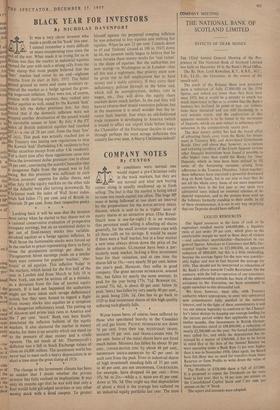BLACK YEAR FOR INVESTORS
By NICHOLAS DAVENPORT IT was a very clever investor who made a profit on his `book' this year.
entered the market as a hedge against the grow-
'e inevitable sooner or later. By July 9 the FT ndex of British industrial equities had touched 207.6—a rise of 28 per cent. from the Suez `low' of 1611. This peak was actually reached just as the Treasury was issuing new regulations to stop the Kuwait `leak' (forbidding UK residents to buy dollar securities except from other UK residents). Pot a short time after these regulations came into force the investment dollar premium rose to about 18 per cent., convincing the scared Chancellor that dangerous flight from the pound was in full swing. But this premium was sufficient to curb British investors' appetite for dollar shares, and after July 10 the equity markets on the other side of the Atlantic were also turning downwards. By eve- Christmas week the index of Wall Street indus- j BP trials had fallen 171 per cent. and of British in- :osts!dustrials 20 per cent. from their respective peaks. e of
Looking back it will be seen that the investor — went astray when he started to buy shares not on
a rational conservative evaluation of prospective Company earnings, but on an emotional desire to get out of fixed-money stocks into variable- dividend equities as a hedge against inflation. In Wall Street the fashionable stocks were forced up etc) in the market to prices representing thirty to forty times the prospective earnings per share. In Throgmorton Street earnings yields on a similar ting basis were common for popular `nuclear,' tronic' or oil equities. This inflation `bulge' in pie- . the markets, which lasted for the first half of the year in London and from March to July 10 in aced New York, can now be written off as a mistake, as a deviation from the line of normal equity the growth. If it had not happened the authorities ,ugh might not have taken such savage deflationary .1 in action, but they were bound to regard a flight wed from money stocks into equities as a symptom the of a dangerous inflationary trend. The putting up ned of discount and prime loan rates in America and ade the 7 per cent. 'shock' Bards rate here finally ade punctured the inflation balloon of the equity s in markets. It also shattered the market in money rely stocks, for there is no security which can stand up our to the pressure of dear money and a credit rise squeeze. The net result of Mr. Thorneycroft's in
deflation was a fall in Stock Exchange values of
t it close on £4,000 million. The investment world has ory never had to meet such a heavy depreciation in so short a time since the great slump of 1929.
of The change in the investment climate has been the so sudden that I doubt whether the private investor has fully realised its implications. It was the is only six months ago that he was told that only a fool would hold gilt-edged securities or any other money stock with a fixed coupon. To protect
tio 100, lone log wage-cost inflation. They were not, of course,
Content with sterling equities; they rushed into nen dollar equities as well, aided by the Kuwait `leak' iced Which left the dollar premium low, for they but feared that if the domestic inflation were not over, stopped another devaluation of the pound would t in and lope gine de-
himself against the perpetual creeping inflation he was exhorted to buy equities and nothing but equities. When he saw 21 per cent. Consols down to 45 and `Daltons' (issued at 100 in 1947) down to 44, the investor really began to believe that he must forsake these money stocks for 'real values' in the shape of equities. But the authorities are now saying—in Washington as in London—that all this was a nightmare, that priority must now be given not to full employment but to hard money and a stable currency. If they carry their deflationary policies through to the bitter end, which will be unemployment, strikes, cuts in wages, etc., they will drive the equity share markets down much farther. In the end they will have to reverse their stupid restrictive policies, but in the meantime, it is small wonder that the in- vestor feels bearish. Just when an old-fashioned trade recession is developing in America (which is bound to affect our export trade before long), the Chancellor of the Exchequer decides to carry through perhaps the most savage deflations this country has ever seen. A Merry Christmas indeed !


























 Previous page
Previous page